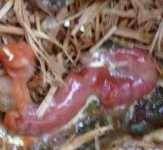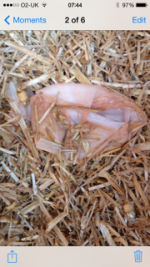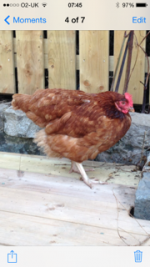Hi
I am really hoping someone can give me a bit of advice.
I am new to keeping chickens. Ten days ago I got three hybrid hens around 26wks old. All was going fine until yesterday my dominant girl 'Rhonda' became very subdued, she didn't lay (normally she is like clockwork), her tail dropped and she stopped eating. I lifted her (she didn't even try to move away) and set her in the coop. I checked on her a bit later and she had laid a soft egg (just membrane holding it together). This morning there was a long thickish pink thread in her poo. I noticed since we got her she seems to do lots of normal poos but equally lots of yellowish runny poos. There were a few white patches visible through her brown feathers. I hadn't worried about the runny poo as she seemed some vibrant and healthy and I put it down to moving stress. I haven't chained the diet and used the same feed as the seller (commercial grade pellets). I possibly give them a bit more treats than they were used to bits of dried bread, veg (tomatoes, sugar snap peas, lettuce) but the runny poo was there from day one.
This morning she was up and perky eating well, she went to the nest box at her 'regular' time and made a bit of noise (didn't lay). The other two girls seem fine. I am concerned this might be egg peritonitis but not sure and was wondering if others had experienced something similar? Should I quarantine her?
Thanks in advance for any info... (phoned a few local vets unfortunately not much experience with poultry).unfortunately pics too big to attach - if I can figure out I will add them.
I am really hoping someone can give me a bit of advice.
I am new to keeping chickens. Ten days ago I got three hybrid hens around 26wks old. All was going fine until yesterday my dominant girl 'Rhonda' became very subdued, she didn't lay (normally she is like clockwork), her tail dropped and she stopped eating. I lifted her (she didn't even try to move away) and set her in the coop. I checked on her a bit later and she had laid a soft egg (just membrane holding it together). This morning there was a long thickish pink thread in her poo. I noticed since we got her she seems to do lots of normal poos but equally lots of yellowish runny poos. There were a few white patches visible through her brown feathers. I hadn't worried about the runny poo as she seemed some vibrant and healthy and I put it down to moving stress. I haven't chained the diet and used the same feed as the seller (commercial grade pellets). I possibly give them a bit more treats than they were used to bits of dried bread, veg (tomatoes, sugar snap peas, lettuce) but the runny poo was there from day one.
This morning she was up and perky eating well, she went to the nest box at her 'regular' time and made a bit of noise (didn't lay). The other two girls seem fine. I am concerned this might be egg peritonitis but not sure and was wondering if others had experienced something similar? Should I quarantine her?
Thanks in advance for any info... (phoned a few local vets unfortunately not much experience with poultry).unfortunately pics too big to attach - if I can figure out I will add them.



